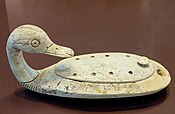Niqmaddu II
| Niqmaddu II | |
|---|---|
| King of Ugarit | |
| King of Ugarit | |
| Reign | c. 1350 BC |
| Predecessor | Ammittamru I |
| Successor | Ar-Halba |
| Religion | Ancient Canaanite religion |
| Ugarit |
|---|
 |
| Places |
| Kings |
| Culture |
| Texts |
Niqmaddu II was the second ruler and king of Ugarit, an ancient Syrian city-state in northwestern Syria (c. 1350–1315 BC) and succeeding his father, Ammittamru I.[1][2] He was a vassal ruler of Suppiluliuma I of Hatti.
Early Life
[edit]Niqmaddu II (Akkadian: 𒃻𒈠𒀭𒅎 Níqmâdâd, "vengeance of Hadad"[3]) took his name from the earlier Amorite ruler Niqmaddu, meaning "Addu has vindicated" to strengthen the supposed Amorite origins of his Ugaritic dynasty.[4]
His wife may have been Pisidqi known from a legal text.[5][6] He had a brother Nuriyãnu.[7]
Reign
[edit]Though the exact date of his accession to the throne of Ugarit is unknown, he might be a contemporary of both Akhenaten and Tutankhamun[8] the Hittite ruler Shuppiluliuma I, and was a vassal of the latter.[4] He had good relations with Egypt, and conceded to the Amorites in a dispute over the Shiyannu region early in his reign.[1] He commissioned the Baal cycle about the god Haddu/Ba'al, and had a son, Niqmepa.[4]
Hittite vassalage
[edit]
In the Hittite Archives there are four letters from the time of Suppiluliuma regarding Ugarit.
- CTH 45[9] Letter of Šuppiluliuma I to Niqmaddu II of Ugarit
- CTH 46 Treaty of Šuppiluliuma I with Niqmaddu II of Ugarit
- CTH 47 Decree of Šuppiluliuma I setting the tribute of Ugarit (.I Akkadian, .II Hittite)
- CTH 48 Inventory of the tribute of Ugarit to Šuppiluliuma I
In EA 49 (EA = El Amarna), Niqmaddu II apparently requested an Egyptian physician and two palace attendants from "Cush", the Egyptian envoy to Ugarit.[8]
He is identified in Syrian on an alabaster vase along with a woman in Egyptian court dress,[10] however, the name of the woman in the vase, if ever indicated, is not preserved[8] and is mentioned in the Baal cycle as King nqmd.[4] He was succeeded briefly by Ar-Halba.
Treaty
[edit]At Ugarit, the treaty is known from RS 17.0339,a + RS 17.0340 + RS 17.0366.[11]
The introduction reveals a rebellion against the great king, where Niqmaddu II remained faithful.
Thus (says) the Sun, Šuppiluliuma, Great King, king of Hatti, warrior. When Itur-Addu, king of Mukiš, and Addu-nirari, king of Nuhašši, and Agi-Tešub, king of Niya, turned hostile towards the Sun, the Great King, their lord, and they mustered their troops and captured cities from Ugarit, and they oppressed Ugarit and carried off as captives the subjects of Niqmaddu, king of Ugarit, and devastated Ugarit.
Niqmaddu II asked Suppiluliuma I for aid.
Niqmaddu, king of Ugarit, came to Šuppiluliuma, the great king, saying: "May the Sun, the Great King, my Lord, save me from the hand of the enemy," saying "I myself am the servant of the Sun, the Great King, my lord," saying "I am hostile towards the enemy of my lord, and I am peaceful towards the friend of my lord," saying "The kings are oppressing me!"
Received captives.
The Great King heard the speech of Niqmaddu, and so the Great King Šuppiluliuma sent the sons of the king and the noblemen with troops and chariots to Ugarit, and they attacked the troops of the enemy [in] the midst of Ugarit. [And] they gave [to] Niqmaddu [all of] their captives whom they took (from the enemy).
Showed great hospitality.
Niqmaddu, king of Ugarit, greatly honored the sons of the king and the noblemen of Hatti. He gave them much silver, gold, and copper. Niqmaddu arrived in Alalah before the Sun, the Great King, his lord and a gift [...] to the Sun, the Great King, his lord.
This section emphasizes loyalty.
He took [...] Niqmaddu did [not] involve himself with words of hostility against the king [his lord, and] the Great King [Šuppiluliuma recognized(?)] the loyalty [of Niqmaddu, king(?)] of Ugarit [...] he did not [... any ... scourings] and shavings [...]
In the final portion is several toponyms.
[...] ancient time [...] Ugarit [...] Ugarit [...] all his land [...] Ugarit [... the sons(?)] of his sons, [...] together with the mountains of Šimeru [...] Bīt-hilu [...] Zimmeru, [...] together with Mount Hešmaraši, [..., Ṣuharu], Yarqanu, [...] Kanzata, Magdala, [together with (its)] mountains, the Crossroads [of Pithana] together with Mount Kiburu, [together with] Mount [Ašamtu, together with Mount] Matraniya, ʾUlullu, [Huluru, Halda], Murar, [Naša, Ulmuwa, Yathaba], Yakunaʿamu, [ʿEn-Zuriya, Nidabu], Kamkatiya, [Harbuǵuli, Šanizula], Baqʿatu, together with [its mountain, Halanu, Napṯatu], Ṯamra, Pugulʾu, [...]ʾa, Šeta, Yaʿaniya, <together with> Mount ʾAyalu, together with Mount Hadamgu, Kidkidiya, Paništayu, Naghatu, Halbu-Nana, Šalma, Gulbata, Zamirtu, Śuladu, Maraʾil, Himullu.
References
[edit]- ^ a b Kuhrt, Amélie (1997). The ancient Near East, c. 3000-330 BC. Vol. 1. Routledge. p. 306. ISBN 0-415-16763-9.
- ^ Feldman, Marian H. (2006). Diplomacy by design: luxury arts and an "international style" in the ancient Near East, 1400-1200 BCE. University of Chicago Press. ISBN 0-226-24044-4.
- ^ Hess, Richard S. (1993). Amarna Personal Names. Eisenbrauns. p. 119. ISBN 0931464714.
- ^ a b c d Smith, Mark S. (1994). The Ugaritic Baal cycle. Vol. 55. BRILL. ISBN 90-04-09995-6.
- ^ Tablet 16.277
- ^ Soldt, Wilfred Hugo van (1991) Studies in the Akkadian of Ugarit Dating and Grammar
- ^ Tablet 16.166
- ^ a b c Watson, Wilfred (1999). Handbook of Ugaritic Studies. BRILL. p. 624. ISBN 9789004109889.
- ^ Altman, A. (1983). Rs 17.132. A Letter Sent by Šuppiluliuma I King of Hatti to Niqmaddu II, King of Ugarit and its Historical and Juridical Significance
- ^ Feldman, Marian H. (2002). "Ambiguous Identities: The -Marriage- Vase of Niqmaddu II and the Elusive Egyptian Princess". Journal of Mediterranean Archaeology. 15 (1). Equinox Publishing Ltd. doi:10.1558/jmea.v15i1.75. ISSN 1743-1700. Archived from the original on 10 July 2011.
- ^ https://oracc.museum.upenn.edu/aemw/ugarit/qpn-x-people?xis=qpn.r0003f9&ref=P503628.4
